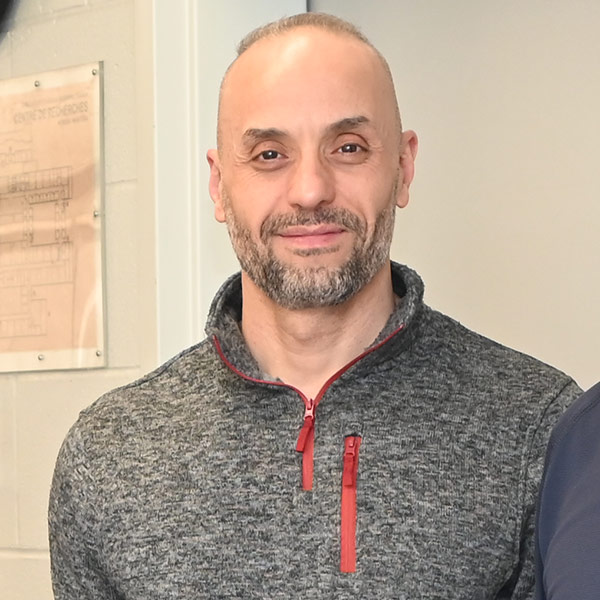Ahmed Abdelmagid, research scientist, Agriculture and Agri-Food Canada

Ahmed Abdelmagid is a research scientist specializing in oilseed crop pathology at Agriculture and Agri-Food Canada’s (AAFC) Morden Research and Development Centre (RDC). Originally from Egypt, Abdelmagid completed his bachelor’s and master’s degrees in plant pathology from Assiut University in Asyut, Egypt. He received a scholarship to Oklahoma State University for his PhD, and then joined the University of Nebraska-Lincoln to do a post doctorate before moving to Canada in 2015. He joined the University of Guelph for a second post doctorate before moving to Winnipeg in 2017. He now lives in Morden with his wife and three kids, who are in Grades 11, nine and four.
Where did you work before AAFC?
I was a research associate at the University of Manitoba. I conducted research on soybean pathology and taught plant pathology to undergraduate and graduate students. After that, I worked in private industry for a year at Farmers Business Network and led the pathology research on canola diseases, specifically blackleg, verticillium stripe, Fusarium wilt and sclerotinia stem rot.
What is the best part about your job?
I really enjoy my new position. It gives me the freedom to choose the research I think is important for farmers. For example, what is more beneficial in terms of the pathology research or for the whole country because I also collaborate with researchers from Ontario, Saskatchewan and Alberta. We all focus on certain objectives that we think the outcomes will be beneficial to farmers across the Prairies.
What got you interested in this area of work?
When you study agriculture in Egypt the first two years are general, and you choose your major during the third and fourth years. At the time, I didn’t know which department I should join, and I had been warned that plant pathology would be difficult as most of the study would be in English due to the number of scientific pathogen names I would need to memorize.
I saw it as a challenge and looked at it from a different perspective. People get sick and go to the doctor for a bacterial or viral infection. They can speak about their symptoms, but with plants you have to see and study the symptoms to discover which disease it is. I found that to be truly interesting and we were a smaller group of students, which is how I got started into pathology.
Tell us a bit about what you’re working on at AAFC.
Our program focuses on the pathology or plant diseases affecting canola, sunflower, soybean and flax in Manitoba and Canada. I collaborate with breeders across the Prairies and Canada to find new sources of resistance against the most important diseases affecting these crops, and we look at best disease management strategies.
Last year, we began working on a sunflower disease survey funded by Manitoba Crop Alliance. This survey will be similar to what we do on other crops, but it will be very interesting because for many years there has been no verified information about the most important diseases that affect sunflowers in Manitoba and Canada.
We will be in the fields to see what the most important diseases affecting yield and quality of the heads are across Manitoba. We will collect samples of the roots, stems and heads and bring them to the lab to do isolation and identification. From there, we will report on what we saw during the growing season. It will be very beneficial to the industry to know what those diseases are, so the breeding programs can focus on them in the future.
What can you say about the value of farmers providing funding and support to your organization?
It is very valuable. Farmer support is crucial to make our research more practical and applied. We receive funds from other resources to investigate different research ideas, but the link between science and farmers is very important. It tells us as researchers what is important for farmers, what would be more beneficial for them in the future and what ideas or challenges we need to work to solve.
How does that farmer funding and support directly benefit farmers?
We are working on the problems that worry farmers and that they need solutions to, especially in the short term. We know they don’t want to see a solution in six or 10 years – they want to see something practical in the short term. We work to give them verified data and good results, and in some cases, we can recommend management strategies.
How do you spend your time outside of work?
Winter in Manitoba is too long, especially for someone like me from the desert. Although I’ve been here for several years, I still have a hard time enjoying outdoor activities in the winter. Time outdoors in the summer is very precious, and I enjoy it a lot.
What is your favourite food or favourite meal to cook?
Foul mudammas (Egyptian fava beans). In Egypt, fava beans are a main dish, especially for breakfast. It’s special, very simple and very healthy.
All you have to do is rinse a can of fava beans, put them in a deep pan with a little bit of oil of your choice. Cut tomato and green pepper, and put the mixture on medium heat. Cover it and leave it for about 7 to 10 minutes. Next add lemon, salt and cumin. Smash it together with a fork, and you can eat it with toast or pita bread. It’s delicious!
